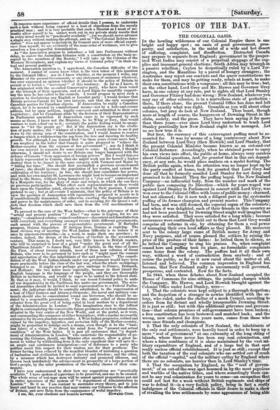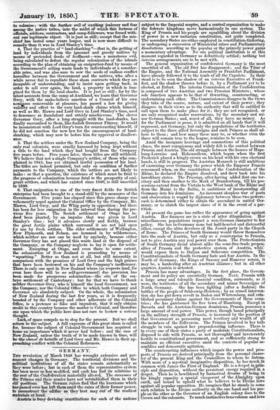TOPICS OF THE DAY.
1.1:LIN, COLONIAL OASIS.
IN the howling wilderness of our Colonial Empire there is one bright and happy spot ; an oasis of good government, pros- perity, and satisfaction, in the midst of a wide and hot desert of suffering, complaint, and disaffection. Distracted Canada
may prepare to separate from England; government in the pauper- ized prepare
Indies may consist of a perpetual stoppage of the sup-
plies and incessant general elections; South Africa may triumph in a passive rebellion ; Ceylon be despotically ruled by a Lord Tor- rington, and the Mauritius by a parcel of hungry strangers ; the Australias may reject our convicts and the queer constitutions we make for them, and may be getting ready, rebels at heart, to make their own constitutions with a vengeance : all this may be true ; but, on the other hand, Lord Grey and Mr. Hawes and Governor Grey have, in one colony at any rate, put to rights all that Lord Stanley and Governor Fitzroy had done wrong : New Zealand, whatever you may say of other colonies, is in a marvellous state of perfection : there, if there alone, the present Colonial Office has done and left undone exactly what was right. Grumble as you will about other colonies, but pray do look at New Zealand. Thus boast, though more at length of course, the hangers-on of Downing Street in the clubs, society, and the press. They have been saying it for more than three years—ever since Lord Grey undertook to teach Lord Stanley practically how New Zealand ought to be managed. Let us see how true it is.
But first, the currency of this extravagant puffing must be ac- counted for. It was by means of a long controversy, about New Zealand between Lord Grey (then Howick) and Lord Stanley, that the present Colonial Minister became known as an out-and-out Colonial Reformer. Accordingly, when he obtained power to carry his own -views into effect, the public at home, always very careless about Colonial questions, took for granted that in this one depend- ency, at any rate, he would place matters on a model footing. The British public again, when its attention was no longer kept up by the party, conflict at home, took for granted that Lord Grey had done all that he formerly assailed Lord Stanley for not doing and promised to do himself. Then the puffing began. The New Zealand Company—an influential body, from the number and mark of the public men composing its Direction—which for years waged war against Lord Stanley, in Parliament in concert with Lord Grey, was won over to the Colonial Office with loans of public money: charmed, but not silenced; for it now took a diligent part in the systematic puffing of its former champion and present master. This Company had been, and was still deemed, the especial organ of the colonists; and when it was delighted, such of their friends in this country as had not been purchased by Downing Street might well imagine that they were satisfied. They were satisfied for a long while ; because assurances were continually held out to them that Lord Grey would comprise all reforms in one, by obtaining for them a real power of managing their own local affairs as they pleased. He moreover sent to the colony large sums of British money for Army and Navy purposes, and of course pleased the settlers by raising the price of the produce of their farms : he bribed them to silence, as he bribed the Company to sing his praises. So, when complaint ceased here and puffing took its place, no formidable complaints came home from the colony. The puffers had it all their own way, without a word of contradiction from anybody : and of course the public, so far as it now cared about the matter at all, listened and believed. The common impression in England has become, that New Zealand really is uncommonly well governed, prosperous, and contented. Now for the facts.
In 1845, when three debates about New Zealand occupied. the House of Commons for nine sittings, the principal charges which the Company, Mr. Hawes, and Lord Howick brought against the Colonial Office under Lord Stanley, were- 1. That the colonists were kept subject to a thorough despotism; and the despotism of a stranger in nowise identified with the co- lony, who ruled, under the shelter of a mock Council, according to orders from far distant and wholly irresponsible Downing Street. It is just so still ; but with this additional grievance and provoca- tion—that solemn promises of self-government have been broken; a free constitution has been bestowed and snatched back ; and the wrong, now endured for five years more, comes from those who were once friends and champions. 2. That the only colonists of New Zealand, the inhabitants of the only real settlements, were heavily taxed in order to keep up a mere " seat of government" at one extremity of the long string of islands, where there never has been any real colonization, and where a false semblance of it is alone maintained by the vast mi- litary expenditure of 'England, and of a large but in that spot really useless official establishment. It is just so still ; except that both the taxation of the real colonists who are settled out of reach of the official " capital," and the military outlay by England where there are no colonists, are heavier than m Lord Stanley's time. 3. That the occupation by England, as the " seat of govern- ment," of an out-of-the-way spot hemmed in by the most populous and warlike of the native tribes, and where accordingly there can- not be any real colonization for years to come—an occupation that could not last for a week without British regiments and ships of war to defend it—is a very foolish policy, being in fact a costly indulgence of the Colonial officials in their desire to make a show of rivalling the true settlements by some appearance of being able to colonize ; with the further evil of excitingjealousy and fear among the native tribes, into the midst of which this fortress of officials, soldiers, contractors, and camp-followers, was forced with- out one legitimate object. It is just so still; except that the mis- chief has lasted some years longer, and is now more difficult to remedy than it, was in Lord Stanley's time. 4. That the practice of " land-sharking "—that is, the getting of land by individuals from the ignorant and greedy natives by means of pretended deeds of feoffment—was a monstrous evi4 being calculated to defeat the regular colonization of the islands according to the plan of obtaining an emigration-fund by means of
the Government's selling waste lands to individuals at a consider- able price, and was also sure to sow the seeds of endless conflict hereafter between the Government and the natives, who after a while never fail to repudiate these sham contracts which they are incapable of understanding, and to insist upon getting back, in order to sell over again,, the land, a property in which is ima- gined for them by the land-sharks. It is just so still; for by the latest accounts from the camp at Auckland, we learn that Governor Grey, with the make-believe sanction of a Council of his own nomkiees removeable at pleasure, has passed a law for giving valiffty and effect to the very land-shark claims which himself, as well as Mr. Hawes and Lord Grey in Lord Stanley's time, used to denounce as fraudulent and utterly mischievous. The clever Governor Grey, after a long struggle with the land-sharks, has finally succumbed to them, like foolish Governor Fitzroy. It would be inconsistent with Lord Grey's tarn for counteracting himself, if he did not sanction the new law for the encouragement of land- sharking, which may now be before him for approval or disallow- ance.
6. That the settlers under the New Zealand Company, being the only real colonists, were cruelly harassed by being kept without a title to the land which they had bought from the Company five years before. Five years later, these titles are still withheld. We believe that not a single Company's settler, of those who oom- plained in 1845, has yet obtained lawful possession of his land. The titles are indeed promised, but only on condition of further payments to the Company, which the settlers are not likely to make : so that a question, the existence of which must be fatal to the progress of colonization because fatal to the prosperity of emi- grant settlers, and which has existed since 1840, is still unsettled in 1850.
6. That emigration to one of the very finest fields for British enterprise had been brought to a stand-still by the measures of the Government. Five years has elapsed since this grave charge was vehemently urged against the Colonial Office by the Company, Mr. Hawes, Lord Grey, and the Whig party in opposition : but there has been far less emigration in the interval than during the pre- vious five years. The Scotch settlement of Otago has in- deed been planted, by an impulse that was given in Lord Stanley's time : but it advances slowly and feebly, because the great fertile plains which surround it are not laid open for use by fresh settlers. The elder settlements of Wellington, New Plymouth, and Nelson, are hemmed in by wildernesses, which neither are nor can be used by anybody, because either Governor Grey has not placed this waste land at the disposal of the Company, or the Company neglects to lay it open for settle- ment. Excepting at Otago, and even there to . some extent, the colonization of- New Zealand is proceeding by means of " squatting." Better so than not at all, but still miserably in comparison with the promises of Lord Grey and the high praises that have been bestowed on his and the Company's inefficiency. There is only one spot in New Zealand where (as respects land, for even here there will be no self-government) due provision has been made for prosperous colonization—the site of the em- bryo settlement of Canterbury : but for that we have to thank neither Governor Grey, who is himself the local Government, nor the Company, nor the Colonial Office to which both Company and Governor are absolutely subject. On the whole, the colonization of New Zealand during the last few years, as it is frequently boasted of by the Company and other adherents of the Colonial Office, is a pretence so false and impudent, that it only obtains credit in this country because the matter is Colonial, and therefore one upon which the public here does not care to bestow a serious thought.
Lack,,of space compels us to stop for the present. But we shall return to the subject. A full exposure of this great sham is called for, because the subject of Colonial Government has acquired at home an importance which it never had before ; and the ease of New Zealand, unless the truth of it be made known in time, will be the cheral de Waffle of Lord Grey and Mr. Hawes in their ap- proaching conflict with the Colonial Reformers.



























 Previous page
Previous page